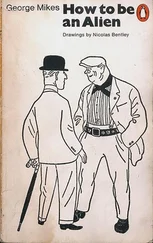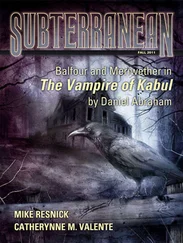Mike Resnick - I, Alien
Здесь есть возможность читать онлайн «Mike Resnick - I, Alien» весь текст электронной книги совершенно бесплатно (целиком полную версию без сокращений). В некоторых случаях можно слушать аудио, скачать через торрент в формате fb2 и присутствует краткое содержание. Город: New York, Год выпуска: 2005, ISBN: 2005, Издательство: DAW Books, Жанр: Фантастика и фэнтези, на английском языке. Описание произведения, (предисловие) а так же отзывы посетителей доступны на портале библиотеки ЛибКат.
- Название:I, Alien
- Автор:
- Издательство:DAW Books
- Жанр:
- Год:2005
- Город:New York
- ISBN:978-0756402358
- Рейтинг книги:4 / 5. Голосов: 1
-
Избранное:Добавить в избранное
- Отзывы:
-
Ваша оценка:
- 80
- 1
- 2
- 3
- 4
- 5
I, Alien: краткое содержание, описание и аннотация
Предлагаем к чтению аннотацию, описание, краткое содержание или предисловие (зависит от того, что написал сам автор книги «I, Alien»). Если вы не нашли необходимую информацию о книге — напишите в комментариях, мы постараемся отыскать её.
I, Alien — читать онлайн бесплатно полную книгу (весь текст) целиком
Ниже представлен текст книги, разбитый по страницам. Система сохранения места последней прочитанной страницы, позволяет с удобством читать онлайн бесплатно книгу «I, Alien», без необходимости каждый раз заново искать на чём Вы остановились. Поставьте закладку, и сможете в любой момент перейти на страницу, на которой закончили чтение.
Интервал:
Закладка:
This culture is as unlike my own as any storyteller could imagine. Chaotic, noisy, the natives rush frenetically about, ever busy, even at night—the lights of the city drown out the stars overhead. I spend hours, too many of them, by the ocean—this is a seaport—when I should be in the libraries and museums, learning about these creatures. But I find the frantic pace they live at overwhelming. The sea brings me a measure of peace as I watch it ebb and flow and crash and murmur. It reminds me of home, even the natives swimming— they call it swimming, at least; to me it is clumsy thrashing, fighting the water rather than being one with it.
I take out the Link and stare at it. Among the decorative elements on its surface there is one stud that is meant for Recall, in case of such unforeseen and serious emergencies such as civil unrest, natural catastrophe, or war. Definitely not for use by homesick scholars.
We were originally a seafaring culture. Perhaps because the sea is so vast, and accidents are so random and sudden, my kind developed a formal and structured society: every situation noted, every situation with its appropriate actions, every situation accounted for.
I know in my heart I don’t fit in very well. I liked to test myself against the sea too often. This was a sorrow to my family. When I should have been attending to my share of the clan duties, I was inattentive, my mind on the waters.
I am ashamed of this. I owe my family much, for they have supported me in the study of other cultures, a study I love. Many clans decide the paths their youthful members should tread, without taking personal preferences into account. But I am fortunate, for my clan is different. Our Mother Supreme is very old and very wise, and feels that children work harder and more willingly—and thus are more likely to do well—when they work at something they enjoy. So she indulges us. I owe it to her and to my parents to repay their trust and confidence in me.
I’m beginning to feel smothered under the weight of all these obligations and expectations.
I was daring today. The waves were high, crashing on the shore. I longed so much for the feel of the sea that I dared to venture into the water, yes, into the water in this temporary form I wear. I swam.
I attempted to swim, rather. Oh, but it is a feeble reed, this body. Clumsy, awkward in the water, un-streamlined, no harmony with the currents. Worst of all, no way to stay below the surface for more than seconds at a time—as I discovered, choking and spluttering. Of course, no water-breathing structures. Why didn’t they warn me against this?
Because it never occurred to them. When the thrice-ignorant fools who surveyed this world did so, they reported no cities by the sea. I am certain they never bothered to look.
I staggered from the water and collapsed on the beach. I was fortunate it was early morning, and the beach was almost deserted. There was no one to see my humiliation.
But as I regained my breath, I noticed there were a few swimmers out there. No, wait, not swimming. They were balanced on long narrow boards, balanced on the very crests of the waves surging to shore, balanced like dancers.
My jaw dropped. My people have never even dreamed of such a thing. These people call it “surfing.”
I inquire at the library. “I wonder if you can help me. I’d like to learn about the history of surfing, and I don’t really know where to begin.” When I explain I was inspired watching the surfers at the nearby beach, the librarian laughs.
“Oh, we don’t have serious surfing here —those are just baby waves. I think a tape of last year’s Hawaiian championships has just come back in…” The helpful librarian brings me audiovisual records of surfing contests held in other parts of the world. I’m astounded when I view them. The local waves are indeed just “babies,” and the surfers I saw are far from expert. The award-winning surfers do things I wouldn’t have believed possible. Of course, I find the size of the waves they’re riding almost impossible to believe as well, but the librarian assures me these are factual records, no trickery involved.
“Not like that new movie—I hear they used a lot of special effects in that one to make the waves look so huge.”
Movies? Special effects? I decide to leave that for another day. I want to view the sequence called “shooting the curl” again.
There is clearly more to this species than I realized.
I wander the streets. Fortunately, the weather is mild this time of year and I can sleep outdoors, provided I stay out of the way of others. I am equipped with food concentrates and there are public water sources. But this is only a short-term solution; I need a place to store my equipment and belongings, to archive my research records, and—most importantly— to have a little solitude and be able to meditate. It is only by merest chance that I am lucky enough to stumble into a niche where I can support myself and study this culture more closely.
I see a street performer, who entertains the passing crowd; in return they drop money into a basket at his feet. He’s a conjurer—misleading the audience by the skill of his hands and his clever patter. I realize my gadgets will be useful after all. It appears magic tricks can be entertaining, even if the culture no longer believes in magic… or at least claims it doesn’t. And a street performer doesn’t need an elaborate background history.
I become a magician. My tricks with lights and smokes and colors fascinate them, and they pay well, far better than I expected. They come again and again, bringing friends. I discover, to my relief, I don’t have to talk. Indeed, my silence seems to add to my mystique. And I learn, also to my relief, that my evasive answers to questions after my performances are considered entirely appropriate. No one really wants to know how it’s done.
My Supervisor is pleased with my inventiveness. “Well done, Student Candidate! I believe your achievement is unique—an illusionist in a technological society. Continue your research—this will make a fine presentation at the next colloquium. Communication ending.”
Research. I should be spending much of my time studying this world’s past and present knowledge. Its history, its science and art, everything about it. But there’s so much knowledge. I could spend far more than a tenth-span just assimilating the knowledge of the one library near the apartment I now rent, let alone every library in the city. I could spend a lifetime.
I like performing; it’s much more fun than doing research. It’s rewarding to see the awe on the faces of the audience and hear the delight in their laughter at the climax of a trick. Children are the most fun of all. Their eyes grow huge and they squeal with joy and clap their hands. I find it impossible to resist them.
I watch my spectators carefully, and learn better pacing and timing. I begin to study magicians and the history of illusions in the library, and try to develop better tricks. I become a fixture among the street performers and begin to make friends. I have the usual cover story ready: a traveler from a distant country, learning about this one. Friendships form easily in this culture; apparently there is nothing like the cautious negotiation of mutual obligations that accompanies such a relationship on my world.
I have become such a fixture, in fact, that I’m beginning to recognize some of the regular attendees of my performances. The other artists tease me—they say I have a “fan following.” (The concept is new to me, and I learn it has nothing to do with devices for moving air.) These “fans” strike up friendly conversations with me. One of them invites me “to the bar for a drink.” I accept, somewhat nervously.
Читать дальшеИнтервал:
Закладка:
Похожие книги на «I, Alien»
Представляем Вашему вниманию похожие книги на «I, Alien» списком для выбора. Мы отобрали схожую по названию и смыслу литературу в надежде предоставить читателям больше вариантов отыскать новые, интересные, ещё непрочитанные произведения.
Обсуждение, отзывы о книге «I, Alien» и просто собственные мнения читателей. Оставьте ваши комментарии, напишите, что Вы думаете о произведении, его смысле или главных героях. Укажите что конкретно понравилось, а что нет, и почему Вы так считаете.











